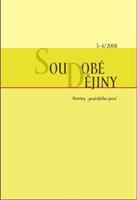Filmy smichu a zapomněni: Obraz „pražskeho jara“ v českem hranem fi lmu z obdobi „normalizace“
Films of Laughter and Forgetting: The ‘Prague Spring’ in Czech Film during the ‘Normalization’ Period
Author(s): Petr KouraSubject(s): History
Published by: AV ČR - Akademie věd České republiky - Ústav pro soudobé dějiny
Summary/Abstract: In this article the author explores the ways in which the events of the ‘Prague Spring’ are depicted in feature films made in Czechoslovakia during the ‘Normalization’ period. These films were made both on the instructions of top-ranking members of the Czechoslovak Communist Party and at the initiative of the film-makers themselves. The author focuses on three films by Karel Stekly (1903–1987), Hroch (Hippopotamus, 1973), Za volantem nepřitel (The Enemy behind the Wheel, 1974), Tam kde hnizdi čapi (Where the Storks Nest, 1975), a fi lm by Vojtěch Trapl (1917–1998), Tobě hrana zvonit nebude (It Won’t Toll for You, My Friend, 1975), and a film by Vaclav Vorliček, Bouřlive vino (Riotous Wine, 1976). The author also provides information about the careers of Stekly and Trapl. The films depict the events of 1968 in Czechoslovakia according to the official interpretation set out in the ideological brochure Poučeni z krizoveho vyvoje ve straně a společnosti po XIII. sjezdu KSČ (Lessons from the Crisis in the Party and Society after the 13th Czechoslovak Communist Party Congress), published in 1970. In keeping with the line laid down in this publication, the attempted reform of the Communist regime is described as a failed ‘counter-revolutionary putsch’, the aim of which was to re-establish capitalism and the ‘bourgeoisie’. The chief proponents of the Prague Spring are portrayed here as intriguers, liars, and swindlers, their sympathizers as criminal elements, who aggressively attack orthodox Communists and opponents of reform. The critics of the Prague Spring, on the other hand, are depicted as honourable, industrious, modest people, who, because of their opinions, became the victims of physical and verbal attacks. The advocates of reform are even construed to be people responsible for acts of repression in the 1950s, radical extremists who did nothing but damage the idea of Communism. These films were meant, among other things, to justify and ‘explain’ the mass expulsions from the Communist Party and the judicial prosecution of opponents of the ‘Normalization’ regime. None of them, however, depicts the armies of intervention – most end before the troops arrive, or are set afterwards and return to 1968 in flashbacks. In terms of genre, three of the five films considered here can legitimately be called political dramas, though there is also burlesque (in Hroch) and comedy (in Bouřlive vino). Though awarded prizes by the regime, the films were not particularly well received by the public, and were, with the exception of Bouřlive vino, poorly attended.
Journal: Soudobé Dějiny
- Issue Year: XV/2008
- Issue No: 03-04
- Page Range: 575-606
- Page Count: 32
- Language: Czech

